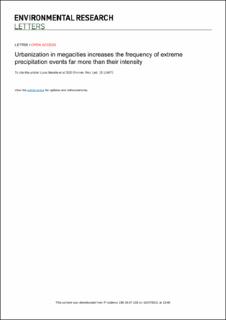Urbanization in megacities increases the frequency of extreme precipitation events far more than their intensity
Marelle-Sebrechts, Louis; Myhre, Gunnar; Steensen, Birthe Marie Rødssæteren; Hodnebrog, Øivind; Alterskjær, Kari; Sillmann, Jana
Journal article, Peer reviewed
Published version

Åpne
Permanent lenke
https://hdl.handle.net/11250/2770894Utgivelsesdato
2020Metadata
Vis full innførselSamlinger
- Journal articles [478]
Originalversjon
10.1088/1748-9326/abcc8fSammendrag
More than half of the world's population lives in urban areas (UN Population Division 2018 The World's cities in 2018 (UN: New York)), which are especially vulnerable to climate extremes (Field et al 2012 Managing the Risks of Extreme Events and Disasters to Advance Climate Change Adaptation: Special Report of the Intergovernmental Panel on Climate Change (Cambridge: Cambridge University Press)). Urbanization itself is known to increase surface temperatures, but its quantitative effect on extreme precipitation remains very uncertain. Using decadal convection-permitting climate simulations in four midlatitude megacities (Paris, France; New York City, USA; Tokyo, Japan; Shanghai, China), we show that urbanization can strongly increase the frequency and intensity of extreme urban precipitation. Frequency increases far more than intensity, by +16% (11%–22%) (95% confidence interval) for 1 year daily extremes, and +26% (11%–41%) for 1 year hourly extremes, downwind of city centers. Intensities of the same events increase by +5% (3.2%–6.4%) (daily extremes) and +6% (3.2%–9.8%) (hourly extremes), respectively. The intensity and frequency of extremes increases more for the rarest, most extreme events considered, and there is some indication that hourly extremes increase more than daily extremes. Our simulations also show that direct urban anthropogenic emissions of heat could be an important factor driving these changes. Urbanization is expected to continue in the future, and our results indicate that these effects should be considered in urban planning decisions to make cities more resilient to extreme precipitation.
